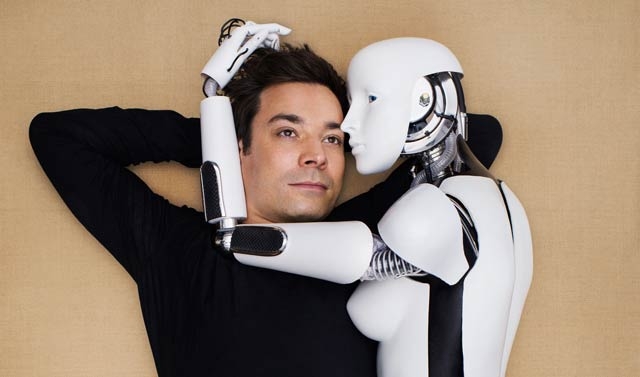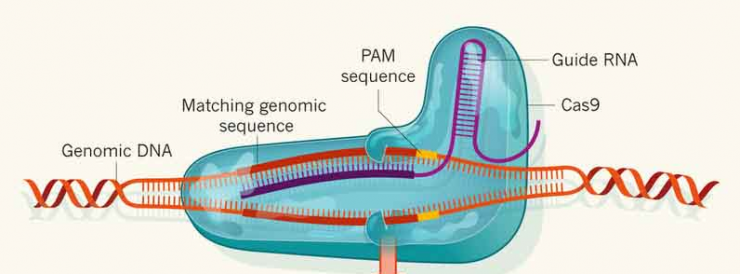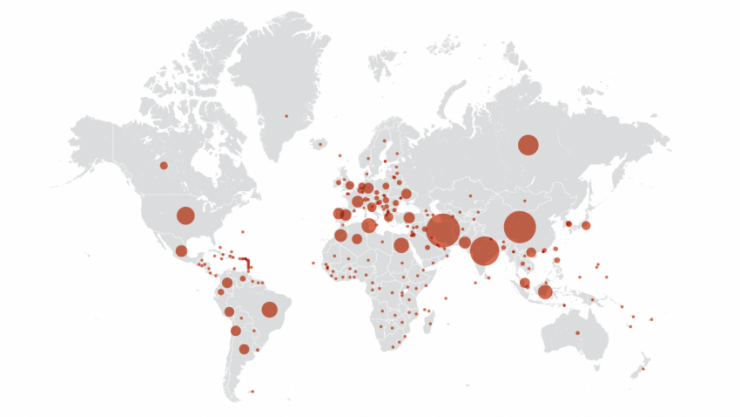
There are some hot potato in the scientific and technological community, and even experiments are not allowed. They are either on the margins of existing social ethics and laws, or they imply the impact of destroying the entire earth's ecology.
However, there are a wave of scientific researchers who always believe that these dangerous factors are controllable, and that humans just need to be brave.
Last week, a "forbidden technology" conference held at the MIT Media Lab called, those devoted to long-term research activities are not allowed to conduct meetings, this long list of list of "taboo technology" include: Sex There are 7 topics such as robots, earth climate reform, gene editing, and academic papers free of charge . Since the other three topics mainly concern issues such as firearms management medical investment and other issues in the United States, this article will not be discussed. However, only the first four issues are enough for us to think for a long time.
Sex robot: bring social stigma
Scientific research on “sex†has always faced more obstacles in human society than other disciplines. Today, sex robots do not pose much problem, but the key is that this is not an ordinary sex robot, but a sex robot that simulates the size of children.

Picture from: Techcentral
For more than a decade, people have combined virtual reality (VR) psychoanalytic treatment methods to treat a wide range of behavioral disorders. Criminal behavior is also considered to be a behavioral disorder.
Some researchers also use VR technology to study and treat patients with sexually aggressive tendencies. A handful of researchers believe that child-sized sex robots or similar characters in VR can help them research pedophilia patients and find out their causes and patterns to "prescribe the right medicine . " It is even possible for patients to have a safer means of venting to reduce their likelihood of "recurring" in real society.

Picture from:Irish Examiner
However, opposition voices indicate that a series of related studies have shown that the possibility of a person who has already committed sexual assault is determined by many potential “risk factors.†The scenarios simulated by VR do not fully capture these “risk factorsâ€. The patient who may eventually show rehabilitation in the VR simulation does not actually recover, and those who have recovered may also be considered to still have the disease.
For pedophilia patients, there is more controversy about this treatment. In some countries, even computer-generated cartoon images are illegal, especially children. Earlier, a British man was arrested for holding a large number of comic pictures of this type.
However, people currently know little about pedophilia patients and the research process is quite difficult. In the United States, researchers must report their list of subjects to the police station.
Robot ethicist Kate Darling said at the meeting:
“I would like to know if we can use the machine to help with the treatment. We do not currently know whether we can do this, nor can we study this because the patients themselves carry a huge social stigma.†At the same time she stated that high quality Sex robots will come before "the society has not had time to discuss this".
Transforming Earth's Climate: George Orwell's Salvation?Although global warming has become increasingly severe, people are also aware of the hazards that they mean, such as the rise of sea levels leading to the disappearance of a large number of island nations, and the increasingly unbearable summer heat.
However, global carbon emissions have not been reduced, and reducing carbon emissions is contrary to economic growth.

Picture from: The Economist
Moreover, one of the most critical issues is that a single reduction in carbon emissions may not solve the underlying problem . Because the large amount of carbon dioxide that has accumulated in the atmosphere does not disappear in a short time. Even if we do not emit carbon dioxide at all from now on, carbon dioxide is still there and will last for decades. Research shows that at least 1000 years, the global temperature will still rise.
According to David Keith of Applied Physics at Harvard University, there is a simple and low-cost solution:
In the atmosphere, a certain proportion of sulfur dioxide particles are released, and 1% of the 100% of the sun's rays are reflected off. This reduces the amount of sunlight reaching the earth and lowers the earth's temperature. This method is called " solar radiation management " (SRM) and the earliest concept began in the mid-1970s. Hundreds of academic papers are currently used to simulate a large number of computers to predict the possible consequences of this program.

Picture from: Wikipedia
Because sulfur dioxide is a well-known contaminant, if the atmosphere accumulates too much and meets water vapor, acid rain will form. It is widely feared that such experiments will put more pollutants into the atmosphere.
However, according to the Keith team's plan, since these sulfides are released into the stratosphere, the atmosphere mainly flows in the horizontal direction in the stratosphere, and the movement in the vertical direction is weak, so the airflow is stable, and there is basically no vertical convection. So these sulphides will stay here all the time, they will not return to the earth and form the acid rain that people fear, and they can artificially control the dosage to ensure that there is no line.
However, the key issue is that the ozone layer happens to be in the stratosphere . Even if there is no acid rain, but it will destroy the ozone layer? .
The answer is, don't know.
To find out if there is an effect on the ozone layer, a small-scale atmospheric experiment is needed. And that's what Keith is trying so hard to do, but it's not allowed.
Even in academic circles, there are many people who strongly oppose this proposal. Raymond Pierrehumbert, a geophysicist at the University of Chicago, said:
"The so-called 'solar radiation management' is a kind of George Orwellian rhetoric . This word just makes your crazy ideas easier to accept. We are discussing the transformation of the entire atmosphere of the Earth."
This means that we will have a "different" planet, and even the sky will become more white. Moreover, if the earth's temperature continues to rise, you must increase the use of sulfur dioxide dose, which is a bottomless hole, the consequences can be disastrous.
Keith said at the meeting.
"I don't mean that this plan will succeed, but if you don't start serious research like this, you must be reckless. The sooner you discover if this works, the better. We need a serious, open, and practical international Research projects, but we don't currently. And this is politically weak."
Gene Editing: Great or Crazy?This refers to the emerging gene editing tool in recent years: CRISPR.
CRISPR is a DNA sequence that exists in bacteria. When a virus invades a bacteria, it secretly hides a piece of DNA into a long string of DNA. CRISPR copies a string of RNA. Together with the protein Cas9, this RNA is like two sentinels. It takes a flashlight and scans along its own DNA to find the hidden thief DNA. Cas9 is like a "Scissors" cut the thief out and took it.

Picture from: Origene
The whole process of cutting genes in this description is called "gene editing". Its advantages are easy operation, high accuracy, and lower cost than traditional tools. And there is a more important trait that distinguishes it from general GM technology: it simply cuts off the original gene and does not add new foreign genes , so the resulting food is not subject to supervision. . This makes it welcome to the capital.
Accompanying this technology is the idea of ​​scientists who are either great or crazy to change the genes of the biological world. People are worried about these species changes in the laboratory. In the event of a laboratory accident, the mutated species will spread to the wild and cause serious damage to the natural ecology.
Synthetic biologist Kevin Esvelt said at the conference:
"There are some things that should not be banned, but there are other things we just need to set up some obstacles."
By the words, CRISPR is required to set limits.
However, these specific restrictions have not been worked out. CRISPR can not only be used on animals and plants, but also on human cells, not only adult cells but also human embryonic cells.

Picture from: The Plaid Zebra
In other words: This technology contains a huge possibility of changing the human species . The fact is that there are already research institutes in the world that have begun to use them in human genetic transformation. China is one of the most radical countries. In August of this year, China will conduct the world's first human CRISPR gene editing clinical trial, and the experimental subject is an adult.
Free Academic Results: Everyone Loves Pirate WebsiteDoes anyone anywhere on Earth have the right to consult publicly funded scientific research?
Answer website company called "Sci-Hub" is given its own slogan: remove all obstacles to scientific road (To Remove All Barriers In The Way of Science).
This Russian website is currently the world’s largest “pirate†academic paper website. It is called "pirate website" because nearly 55 million academic papers in it are all obtained through "hacking techniques". They don't pay any fees to the source organization, but at the same time, all of its resources are for any country in the world. Anyone is free and open, and thus has the support of many students and scholars.

Figure from: Sci-Hub official website
The founder of the site was Alexandra Elbakyan, a 20-year-old Kazakh girl from Kazakhstan who was also a researcher who was proficient in software development and neuroscience.
The academic papers in the world are mainly controlled by the giants of several academic journal publishers: JSTOR, Springer, Sage, Elsevier. If you search for a paper in English from a private computer, you will usually jump to one of these websites, and then the web page. There will be a download link, but you will need to pay more than 30 US dollars to download it. This is called Paywalls.
But unlike ordinary music, movies, and other copyrights, the researchers who created the dissertation can't get any benefit from it. They published the article but they can't get any fee and share from the paywall, and such a high price is totally Several academic journals were agreed upon by management.
In his past research at Harvard University, Albakin used the unpaid "infringement" papers shared by others because he could not pay for the hundreds of papers he needed. This experience has led her to believe that only by allowing more people to browse the content behind the paywall, can we enhance the dissemination of knowledge.
In 2011 she founded Sci-Hub. The way Sci-Hub gets these publishers' papers is this:
Use the anonymous accounts of certain academic institutions to access these journal websites to download papers, and the accounts of these academic institutions are said to have been provided voluntarily by scientific researchers. This bypassed the publisher’s cost barriers.
The "Science" magazine website reported on it in April this year and asked a question: Who is downloading "pirate thesis"?
The answer is: everyone.
Researchers are using Sci-Hub in rich or poor countries. As of March of this year, more than half a year, there were more than 2.6 million paper download requests from Iran, 3.4 million in India and 4.4 million in China. Even if the amount of downloads in the United States is astonishing, according to statistics, in the same period of more than six months, New York City has requested 74,000 paper downloads.

Global use of Sci-Hub distribution maps, from: Science
There are more than 3 million unique IP addresses in the world that have used Sci-Hub, and the actual number of users will be more because thousands of people on many university campuses use the same IP address.
Naturally, the cake publisher was cut off to fight back. She was sued by Elsevier last year.
For this, "Science" has made a reader questionnaire for Sci-Hub, and it has the final result. Click to enter: questionnaire results.
We intercepted the first question in the questionnaire and looked at the reader's attitude.
Do you think it is wrong to download "pirate thesis"? The answer is shown below.

Picture from: Science
More than 80% of respondents believe this is not wrong.
Not only abroad, China also faces the same problem. In March this year, Peking University released a news that the service may be interrupted at any time due to the expiration of the contract with China Knowledge Network. Since then, the media has frequently exposed news that the price of HowNet has been excessively high. In 2014, Howe.com’s quotation on Yunnan University was raised from the original 400,000 to 700,000, and the library had temporarily suspended HowNet.
The above four topics of excitement or anger, they wandered over the edge of the cliff, but were caught tightly by a small set of people with a rope. Maybe we really need more courage?
Image from:Fast Codesign
Via The MIT Technology Review